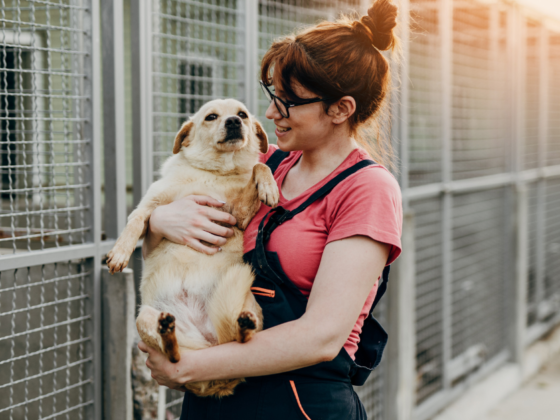Starting an animal shelter is a big undertaking. There’s work to be done, volunteers to be recruited, fundraisers to hold, social media to manage, and more. And when it comes to creating an online presence for your brand new animal shelter, where do you even begin?
Starting an animal shelter can be a rewarding experience, but it can also be difficult and overwhelming. It’s important to know what you’re getting into before you take the plunge. Here’s a look at what owning an animal shelter involves, including some of the costs, responsibilities, and legal hurdles involved.
What Is An Animal Shelter?
An animal shelter is a facility or organization that provides temporary housing for lost, surrendered, or abandoned animals. Animal shelters are run by private organizations, municipal governments, or state governments’ departments of public health. They may be open to the public, limited to their own community, or available to be viewed by appointment.
The mission of an animal shelter is to provide care for homeless animals until they can be adopted into permanent homes. Many animal shelters offer spay and neuter services as well as veterinary care and other medical treatment at low cost or no cost to the public.

What Is The Purpose Of An Animal Shelter?
The purpose of an animal shelter is to provide a safe and comfortable place for homeless animals to stay until they are adopted. Animal shelters are also a place where people can go if they need help with their own pets, such as medical care or behavioral training.
Some shelters also offer educational programs for children or adults who want to learn more about animal care. Many shelters offer classes on everything from basic obedience training to advanced behavior management techniques, and host workshops on topics like puppy socialization and how to care for senior pets. They also host adoption events where you can meet shelter animals in person and learn more about their personalities and needs.
There are many different kinds of animal shelters, but they all have the same goal; to keep animals safe until they can be adopted into a loving home.

How Do You Start An Animal Shelter?
Before you get started on your shelter, it’s important to think about a few things:
- What kinds of animals do you want to focus on?
- What do you want from this project?
- Do you want a space where the animals can roam free, or do you need kennels, or both?
- How much money do you have to spend?
- Who is going to help with the organization and implementation of the project?
You need answers to these questions before moving forward with anything else. Once you’ve figured out your priorities and established an effective team (this may include hiring outside contractors), it’s time to write a business plan. This is where things get really complicated, or really simple, depending on what kind of person you are. Basically, business plans are written documents that detail every aspect of running a successful business; they help keep everything organized so everyone knows what they’re supposed to be doing at all times without getting lost in the weeds. The business plan often entails the following parts:
- Mission Statement
- Company Overview
- Products and Services
- Market Analysis
- Marketing Plan
- Operations Plan
- Financial Plan
The most important thing is to make sure that your business plan fits the needs of your company and its goals. If you’re just starting out, you might want to start small and build from there, so a general business plan may be enough for now. But if you’re an established company looking to expand, then a more detailed plan will help you get there.

What Do You Need To Start An Animal Shelter?
You will have to fill out a lot of paperwork, pay fees, and meet certain requirements. But it’s worth it. When you’re granted 501(c)(3) status, your shelter is officially recognized as a nonprofit organization and can apply for grants and donations from sources like the United Way and other charitable foundations.
You’ll have to submit an application with the IRS, which takes time, usually six months or more, to process (you’ll know they’ve received yours if they send it back with an acknowledgment letter). Once approved, you’ll need to file annual reports every year that detail how your organization uses its funds; these must be filed before March 15 of each year in order for your group to remain tax-exempt through December 31 of that same year.
Then, you’ll need to bring in some professionals. This includes a lawyer who can help you create and implement an animal-friendly lease, an accountant who will handle the finances for your business and help you determine whether it’s feasible to take donations or charge fees for services, and a marketing professional who can design advertising materials and other materials that will attract donors and volunteers and get people excited about the mission of the shelter.
Additionally, you’ll want to bring in a veterinarian if you’re going to offer medical services at all; behaviorists or trainers if you plan on training pets or taking them through classes; and a shelter manager—or perhaps even two—to organize volunteers and direct the operations of each shift as they rotate throughout the week (one day is always reserved for administration).
Regulations And Laws For Animal Shelters
The laws that govern animal shelters vary by state, but they all have the same goal: to ensure that all animals in shelters are treated humanely and receive the medical attention they need. In addition to ensuring that animals are properly cared for, these laws also protect the health of shelter workers and volunteers.
Most states require animal shelters to be licensed by the state. The license is usually renewed every year or two years, and it can be revoked if an inspection finds any violations of state regulations.
Shelters must keep records on each animal’s health and behavior when it comes into their care.
These records help staff identify which animals might be good candidates for adoption or foster placement and which ones would benefit from more intensive treatment before being released back into society—or even euthanasia. These records also help shelters determine whether they need to take any action against an owner whose pet has been given up because it was behaving badly or has become ill or injured while in the owner’s care.

Who Funds Animal Shelters?
Animal shelters are funded by a combination of donations, grants, and fees.
Donations come from individuals, businesses, foundations, and other animal welfare groups. These donations are used to help pay for veterinary care, food, litter, and other supplies needed to keep the animals in the shelter healthy and happy.
Grants are also a significant source of funding for animal shelters. These grants can come from government agencies or private foundations interested in helping animals in need. They can be used for anything from building an adoption center to buying new equipment for the shelter.
There are many organizations that offer grants to animal shelters. Several include:
- American Humane: The Meacham grant is available to shelters looking to expand.
- ASPCA Grant: Offers grants in the form of cash, training, and/or sponsorships.
- Bissell Pet Foundation: Helps with spay and neuter programs, adoptions, and microchipping.
A more comprehensive list is available on the Humane Society of the United States’ website.
Fees are charged when people adopt pets from shelters. The fee covers the cost of caring for the pet while it is in the shelter until it is adopted out to its new home. This fee also helps pay for some of the costs associated with running an animal shelter, such as utilities, insurance, and staff salaries.
Cost Of Opening An Animal Shelter
The total cost of opening an animal shelter can vary depending on a number of factors. These include the size and location of the shelter, as well as its desired amenities. For example, a small animal shelter with no special features may cost less than $30,000 to open. However, if the shelter is located in a high-traffic area and includes luxury features such as a playground for children or an outdoor dog park, the total cost could be upwards of $150,000.
The most expensive aspect of opening an animal shelter is the building itself. If you rent space in a retail area, you can expect to pay between $3 and $5 per square foot per year. If you own your own building, the cost will vary greatly depending on its size and type of construction. In either case, make sure you build in enough room for future growth.
In addition to the costs associated with the building itself, there are also ongoing expenses for running an animal shelter. These include food, water, and other supplies for the animals; electricity; insurance; payroll; marketing and advertising; licensing fees; and taxes.
The most important factor to keep in mind when considering how much money to budget for opening an animal shelter is that it may take several years for your organization to become financially stable. It is important that you get started with enough money to cover all of your initial expenses so that you do not go into debt or have trouble paying bills during this time.

How Does An Animal Shelter Make Money?
One of the main sources of revenue for animal shelters is adoption fees. The average adoption fee at an animal shelter is $150, though it can vary depending on the size of the animal, type or breed, age, and other factors. Another way that animal shelters make money is through donations, both monetary and non-monetary. Monetary donations include things like donations made online or at fundraising events, while non-monetary donations might include food items or supplies for cleaning cages or grooming dogs.
Should You Start An Animal Shelter Or Volunteer?
You’ve always wanted to help animals. You know, the ones that are abandoned, lost, and in need of a home. But you don’t want to just sit around and wait for them to come to you; you want to go find them! So what do you do? Should you volunteer at an established shelter or start your own?
Starting a shelter is a big commitment and responsibility. If you have the space and the time, though, it can be a rewarding experience for both you and the animals. You’ll have the satisfaction of knowing that every animal was treated with care and respect from the moment they arrived until they were placed in their forever home.
If you’re not quite ready to make that kind of commitment, there are plenty of other ways to help out animals in need. There are hundreds of organizations that could use your help, from adopting pets from shelters to fostering them or even just donating money so they can keep their doors open.
At CUDDLY we understand the desire to help, which is why we created an Animal Shelter and Rescue Search option for you to find local shelters and rescues in need. Try out our search and find a local animal shelter or rescue in need of volunteers today.

Why You Should Donate To An Animal Shelter
If you love animals, consider donating to an animal shelter. They are a great way to help the community and help animals at the same time. They help pets find homes. Every year in the United States alone, there are more than 8 million cats and dogs that go into shelters. Many of these animals end up being put down because they can’t find a home. By donating to your local shelter, you can help these pets find forever homes!
Animal shelters help stray animals in need. Many times, people will abandon their pets on the side of the road or leave them outside without food or water because they don’t want them anymore. By donating to your local animal shelter, you can help these less fortunate animals get back on their feet again.
They also provide low-cost vaccinations for pet owners. Your local animal shelter may offer low-cost vaccinations for pet owners, which could save them money in the long run. It may also be helpful if you have other family members who own pets as well, so that everyone is protected from diseases like rabies or distemper virus, which could cause serious damage if not treated immediately.
If you’re looking for a more immediate way to help out, we urge you to take a look at a few of our own donation options like:
- Cuddly Club – A collective who believe happier animals make a happier world
- Rescue Wishlist – You send items and support directly to animals in need
- Pet Pantry – A donation option that sends food directly to shelters and rescues
Remember, what may seem like a small act of kindness really makes a world of a difference to an animal in need. Whether you choose to start your own animal shelter, volunteer, or donate to an existing shelter or rescue, there is always something to be done.










